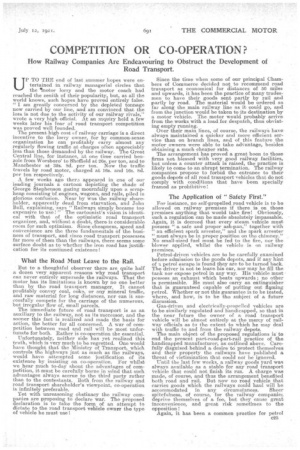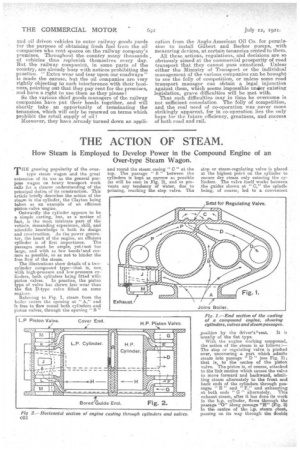COMPETITION OR CO-OPERATION?
Page 21

Page 22

If you've noticed an error in this article please click here to report it so we can fix it.
How Railway Companies Are Endeavouring to Obstruct the Development of Road Transport.
UP TO THE end of last summer hopes were enterbained in railway managerial circles that the "motor lorry and the motor coach had reached the zenith of their popularity, but, as all the World knows, such hopes have proved entirely false. "1 am greatly concerned by the depleted tonnage now carried by our line, and am convumed that the loss is net due to the activity of our railway rivals," wrote a very high•ofileial. At an inquiry held a few weeks later his fear of road transport competition was proved well founded.
The present high cost of railway carriage is a direct incentive to the lorry owner, for by common-sense organization he can profitably carry almost any regularly flowing traffic at charges often appreciably less than those demanded by the railway. The Great Central line, for instance' at one time carried benzoIe from Worsboro' toSheffield at 26s. per ton, and to Manchester at as. 8d. per ton. Now the traffic travels by road motor, charged at 16s. and 16s. 8d. per ton respectively.
A few weeks ago there appeared in one of our leading journals a cartoon depicting the shade of George Stephenson gazing mournfully upon a scrapheap consisting 'of engines, wagons, and rails, piled in glorious confusion. Near by was the railway shareholder, apparently dead from starvation, and John Bull, explaining, • says " Railways simply became too expensive to use!" The cartoonist's vision is identical with that of the optimistic road transport organizer, and, without a doubt, there is considerable room for such optimism. Since 'cheapness, speed and convenience are the three fundamentals of the business of tranepert, and since road transport possesses far more of them than the railways, there seems some surface doubt as to whether the iron road has justification for its continued existence !
What the Road Must Leave to the • Rail.
But to a thoughtful observer there are quite half a dozen very apparent reasons why road transport can never entirely supersede the railways. That the motor has its limitations is knoWn by no one better than by the road transport manager. It cannot profitably convey coal, coke, or any mineral traffic, and raw material for long distances, nor can it sueeessfully compete for the carriage of the numerous, but irregular flow of, small parcels. The immediate future of road transport is as an auxiliary to the railway, not as its Successor, and the sooner this fact is realized and made the basis for action, the better for all concerned. A war of competition between read and rail will be most unfortunate for both. Rather is cooperation the essential. Unfortunately, neither side has yet realized this truth, which is very much to be regretted. One would have thought that the Ministry of Transport, which controls the highways just as much as the railways, would have attempted some justification of its existence by insisting on co-operation. For whilst we hear much to-day about the advantages of competition, it must be carefully borne in mind that such advantages always accrueto the third party rather than to the contestants. Both from the railway and road transport shareholder's viewpoint, co-operation is infinitely preferable.
Yet with unreasoning obstinacy the railway companies are proposing to declare war. The proposed declaration is to take the form of an attempt to dictate to the road transport vehicle owner the type of vehicle he must use
Since the time when some of our principal Chambers of Commerce decided not to recommend road transport as economical for distances of 50 miles and upwards, it has been the practice of many tradesmen to have their goods sent partly by rail and partly by road. The material would be ordered as far along the main railway line as it could go, and from the junction would be taken to-its destination by a motor vehicle. The motor would probably arrive from the works with a load for despatch, thus obviating empty running.
Over their main lines, of course, the railway's have always maintained a quicker and more efficient service than on branch lines, and of this feature the motor owners were able to take advantage, besides obtaining a ranch cheaper rate.
The arrangement has proved a great boon to those firms not blessed with very good railway facilities, but unless a counter attack is raised,. thet practice is
likely tocome to an abrupt termination. railway companies propose to forbid the entrance to their goods depots of all road transport vehicles that do not comply with conditions that have been specially framed as prohibitive!
The Application of "Safety First."
For instance, no self-propelled road vehicle is to be allowed on railway premises if there is on those premises anything that would take fire! Obviously, such a regulation can be made absolutely impassable. Again, it is decreed that every steam vehicle must possess "a safe and proper ash-pan," together with an efficient spark arrester," and the spark arrester "must always be in proper position on the chimney." No small-sized fuel must -be fed to the fire, nor the blower applied, whilst the vehicle is on railway premises.
Petrol-driven vehicles areto be carefully examined before admission to the goods de-pots, and if any hint of a petrol escape is found they are to be turned back. The driver is not to leave his car, nor may he filj the tank nor expose petrol in any way. His vehicle mustpossess an exhaust which beats upwards ; no other is permissible. He must also carry an eixting-uisher that is guaranteed capable of putting out flaming petrol. Whether or not this guarantee is to be tested, where, and how, is to be the subject of a future discussion. -Gas-driven and electrically-propelled vehicles are to be similarly regulated and handicapped, so that in the near future the owner of a road transport vehicle will be almost entirely. at the mercy of railway officials as to the extent to which he may deal with traffic to and from the railway depots.
The main object of the proposed regulations is to end the present part-road-part-rail practice of the handicapped manufacturer, as outlined above. Carefully disguised behind a desire to protect themselves and their property the railways have published a threat of victimization that could not he ignored.
Until the last few weeks, a railway goods yard was always available as a stable for any road transport vehicle that could not finish its run. A charge was made, of course, and thus the arrangement benefited both road and rail. But now no road vehicle that carries goods which the railways could haul will be accommodated in any circumstances. Sheer spitefulness, of course, for the railway companlea deprive themselves of a fee, but they cause great inconvenience, and great risk sometimes to the opposition
Again, it has been a common practice for petrol
and oil driven vehicles to enter railway goods yards for the purpose of obtaining fresh fuel from the oil companies who rent spaces on the railway company's premises. Throughout the country many thousands of vehicles thus replenish themselves every day. But the railway campanieS„ in some parts of the country, are already busy with notices prohibiting the practice. "Extra wear and tear upon our roadways" is made the excuse, hut the ail companies are rorY rightly objecting to such interference with their business, pointing out that they pay rent for the premises, and have a right to use them as they please!
Sc the various chief goods managers of the railway companies have put their heads together, and will shortly take an opportunity of terminating the tenancies, which will only be renewed on terms which prohibit the retail supply of oil!
Moreover, they have already turned down an appli
cation from the Anglo-American Oil Co. for permission to install Gilbert and Barker pumps, with measuring devices, at certain tenancies rented to them. All these actions, regulations, and decisions are so obviously aimed at the commercial prosperity of road transport that they cannot pass unnoticed. Unless either the Ministry of Transport or the individual management of the various companies can be brought to see the folly of competition, or unless some road transport manager can obtain a legal injunction against them, which seems impossible under existing legislation, grave difficulties will be met with. That such difficulties may in time be overcome is not sufficient consolation. The folly of competition, and the real need of co-operation was never more strikingly apparent, for in co-operation lies the only hope for the future efficiency, greatness, and success of both road and rail.
































